|
What Made Thunderbirds Go!: The Authorised Biography of Gerry Anderson
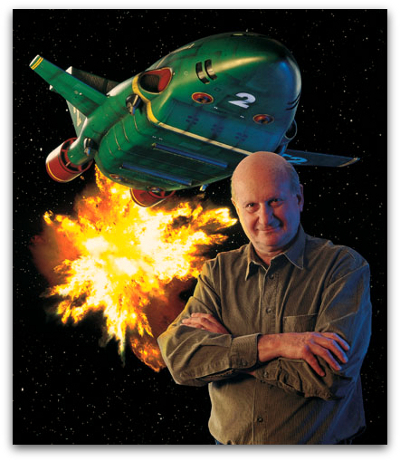
What Made Thunderbirds Go!: The
Authorised Biography of Gerry Anderson was written by Marcus Hearn and
published in 2002. I believe this book is an updated version of an
earlier Anderson biography by other writers but I haven't read that one
so I can't make any comparisons. The book is an enjoyable trawl through
Anderson's up and down career taking in the many fondly remembered (and
often quite eccentric) televisions shows he was responsible for.
Thunderbirds, Captain Scarlet and the Mysterons, UFO, Stingray, Space:
1999, and so on.
What I found interesting was
that Anderson almost got into his famous sci-fi puppet shenanigans by
accident. He had a film production company that hit the rocks and, in
an effort to stay afloat, made a children's series called The
Adventures of Twizzle in the late fifties. On the back of this, all
powerful television impresario Lew Grade helped him to develop Supercar
and Fireball XL5 and Anderson's 'Supermarionation' puppet adventure
career was born. The book is a fun look at all of his famous projects,
plans that never made it onto the screen, and serves as an interesting
reminder too of some of his slightly more forgotten shows like The
Protectors, Space Precinct, and Terrahawks.
One thing that does come across
from the book is that Gerry Anderson probably never quite got his just
due. Despite the incredible fame and success of Thunderbirds in the
sixties (and beyond) he suffered from financial trouble and always had
to battle to get anything on the screen. The book ends before the
mediocre Thunderbirds live action feature film of several years ago but
it was probably symbolic of Anderson's career that he was shut out of
that and had nothing to do with it because he had no control over the
Thunderbirds rights. Apparently, he had an office in the studio where
they were making the film. It must have been like a form of torture.
Thunderbirds attracted millions
of viewers in the sixties and had a hugely successful spin-off comic
but it suffered in the end from ITC's failure to sell the show in the
United States and ended quite abruptly. A new series to be called
Captain Scarlet and the Mysterons was put into production instead. I
think I like Captain Scarlet the best out of all of Anderson's shows
and I really enjoyed reading about it here. I'm not that familar with
Supercar or Fireball XL5 and Stingray was just a teensy bit dull. That
was the one about the submarine and had the soppy ode to 'Marina' over
the end credits.
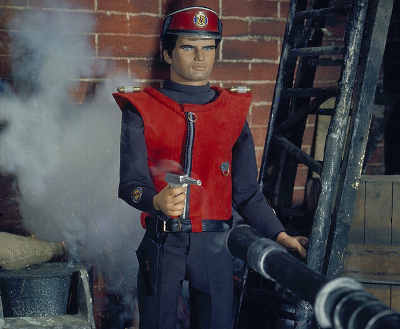
Captain Scarlet was brilliant
though and darker than Anderson's previous offerings - spooky Captain
Black and Mysteron voices. It featured the indestructible Captain
Scarlet battling mysterious ghost like aliens who are intent on revenge
against Earth. The puppets in this one were proportioned differently to
look more realistic and the series had some enjoyable futuristic cars
and vehicles - although I never quite understood why they drove facing
backwards looking at a visual monitor of the road ahead!
Interestingly, the book says
Anderson was less involved in Captain Scarlet than previous shows
because he was making a live action film called Doppelgänger (also
known as Journey to the Far Side of the Sun). Anderson always yearned
to do more films and live action projects despite the puppet adventure
fare that became his stock in trade. Captain Scarlet failed to find an
audience and Joe 90 (about a bespectacled boy spy) didn't fare much
better despite the brilliant intro and music.
Two live action Anderson
projects that are also great fun to read about are UFO and Space: 1999
- two seventies sci-fi shows and both candidates for any list that
compiles the greatest television theme tunes of all time. UFO was
absolutely bonkers with purple haired women wearing skimpy tin foil
dresses and starred Michael Billington, an actor who came within a
whisker of being cast as James Bond on at least two occasions.
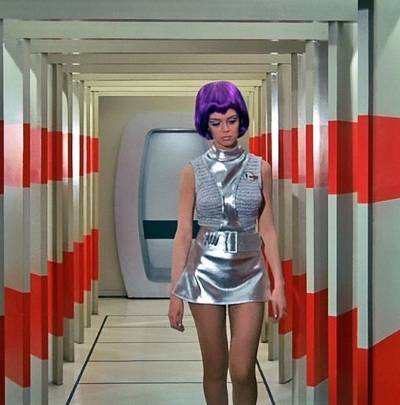
Anderson was actually charged
with coming up with a draft for a film version of Moonraker by the Bond
producers in the late sixties but it never went into production and he
was later rather unhappy when he felt that some of his ideas were being
floated for the 1977 Roger Moore epic The Spy Who Loved Me. Despite
Anderson's energy, UFO lasted only year but Lew Grade suggested he use
it a foundation for his next series - Space: 1999.
Space: 1999 was a relatively
bold if never completely successful attempt to combine Anderson's famed
model work and miniature sets with live action and make a sort of
British version of Star Trek. The series depicted the trials of the
inhabitants of Moonbase Alpha, cast adrift when an explosion sent the
moon floating off into the farthest reaches of space. No, it didn't
really make any sense. The talented American actor Martin Landau was
the stalwart hero (wonder if he ever talks about Space: 1999 in
interviews these days?) and good old Barry Morse played the scientist
Professor Victor Bergman.
The production of the series is
fascinating to read about. Series one was too slow and pretentious so
they just camped it up in series two. The theme tune was jazzed up, the
series was much dafter, they had a woman who could turn into animals
and monsters. It was all to no avail and Space: 1999, like many of
Anderson's shows, proved rather short lived.
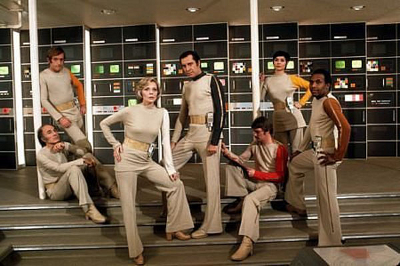
I suppose the happy twist in the
story of Anderson's various ups and downs was that a rerun of
Thunderbirds and Captain Scarlet would always win him a new generation
of young fans. Blue Peter famously drew an incredible response with
their make your own Tracy Island item after repeat showings of
Thunderbirds on BBC2 in the 1990s had been very successful with
children who had never seen the series before.
Anderson's ability to keep
plugging away is very apparent in the book. The eighties saw him return
to the world of sci-fi puppets with Terrahawks but it never really
caught on (this series did though have a fantastic theme tune and
famous noughts & crosses closing title sequence featuring robot
characters from the show). 'Dick Spanner', a series of shorts he did
for a Channel 4 series called Network 7 proved to be very popular
though.
It's fun too to read to about
Space Precinct, another short lived Anderson show, this time from the
nineties. It combined live action with puppets and models and was
essentially Gerry Anderson meets Hill Street Blues. Like Space: 1999,
an American lead actor was drafted in, in this case Ted Shackleford,
one of the stars of soap opera Knots Landing. Knots Landing was a
spin-off series from Dallas and Shackleford played a cousin of Bobby
and JR but let's not get into Knots Landing now.
What Made Thunderbirds Go! is a
lot of fun on the whole, primarily for the immense amount of detail on
all of these shows and the affection for the work of Gerry Anderson.
This is not a warts and all biography written by some neutral observer
but more about the work than digging around too much in the personal
life of the subject. You learn a lot about Anderson though as you chart
the course of his films and career and get a strong sense of his
fortitude and the constant enthusiasm he had for new projects and
ideas. This is a fun read and worth a look if you are interested in
science fiction and British television history.
- Jake
c 2016
Alternative 007
|
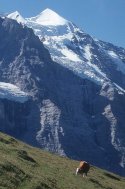
|


